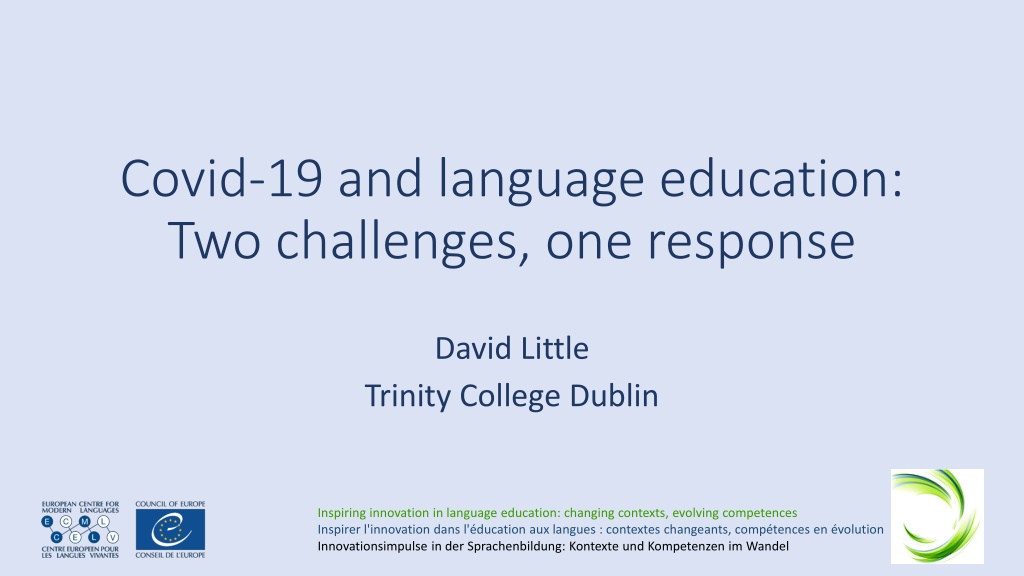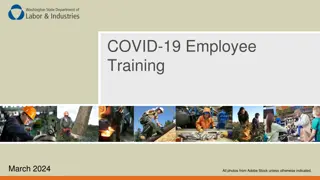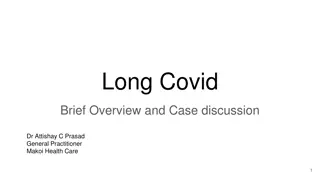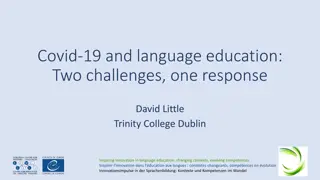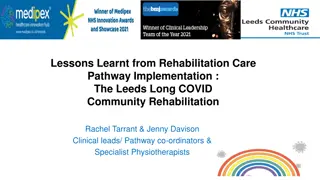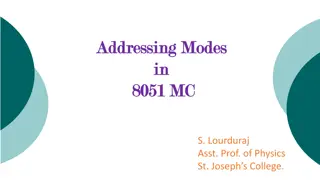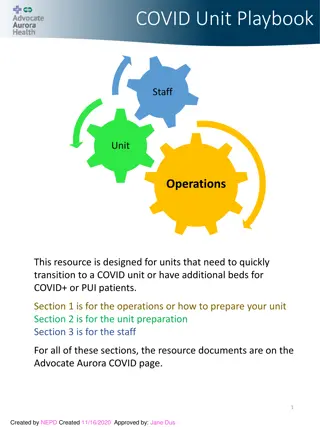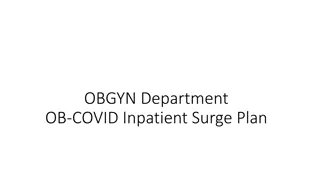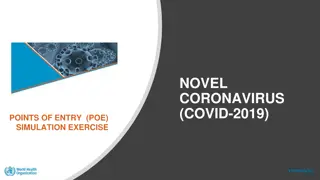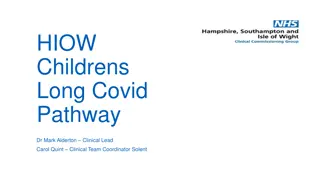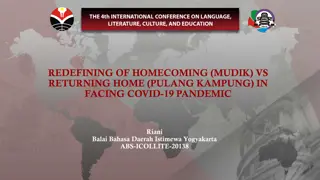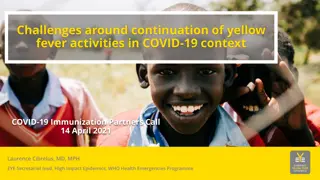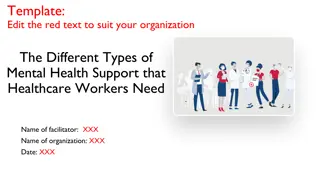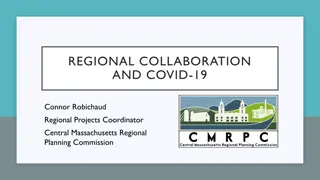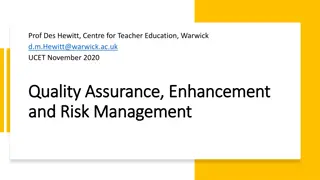Addressing Challenges in Language Education Amidst Covid-19
The Covid-19 pandemic has presented significant challenges to language education, particularly in the areas of public examinations and distance learning. The widespread cancellation of exams has disrupted education systems, while effective distance learning requires more than just technology. The CEFR/CEFR-CV framework offers a comprehensive response by aligning curriculum, teaching, and assessment, emphasizing learner autonomy and participation in the learning process.
Download Presentation

Please find below an Image/Link to download the presentation.
The content on the website is provided AS IS for your information and personal use only. It may not be sold, licensed, or shared on other websites without obtaining consent from the author. Download presentation by click this link. If you encounter any issues during the download, it is possible that the publisher has removed the file from their server.
E N D
Presentation Transcript
Covid-19 and language education: Two challenges, one response David Little Trinity College Dublin Inspiring innovation in language education: changing contexts, evolving competences Inspirer l'innovation dans l' ducation aux langues : contextes changeants, comp tences en volution Innovationsimpulse in der Sprachenbildung: Kontexte und Kompetenzen im Wandel
Even with the development of vaccines, no one knows when the world will find a solution to the Covid-19 problem No one knows if we shall ever return to what we thought of as normal life It is not too soon to confront the educational challenges Covid-19 has brought and search for effective responses The purpose of this webinar: to outline a single, integrated response to two challenges Covid-19 has brought to language education: Public examinations Distance learning
The two challenges 1. Public examinations Widespread cancellation of public exams has thrown education systems into chaos Algorithms are no substitute for student performance and the very fact that they are used raises awkward questions of validity and reliability In most education systems teacher grades for language exams cannot be translated into a summary description of students proficiency When reliance on teacher grades leads to grade inflation , this is the fault of the system, not of teachers 2. Distance learning Effective distance learning requires much more than a reliable laptop, a stable internet connection and a quiet room To what extent are students capable of being autonomous learners? How effectively do we help them to develop skills of self-management? Are we providing them with appropriate tools? As they manage their own learning, how effectively are they able to monitor their own progress in relation to curriculum goals?
The CEFR/CEFR-CV to the rescue Policy The CEFR/CEFR-CV s illustrative scales allow us to bring curriculum, teaching/ learning and assessment into closer alignment with one another than is usually the case Each can do statement can be used simultaneously to specify a learning outcome provide a learning focus imply an assessment task Because can do descriptors focus on behaviour, learners themselves can participate in the new assessment culture that these considerations imply Practice All Council of Europe education projects aim to help develop the individual citizen s ability to participate, critically and proactively, in the democratic process The Council of Europe first introduced the concept of learner autonomy to language education (Holec 1979) The language user/learner described by the CEFR/CEFR-CV is autonomous by definition a social agent who has tasks to perform (cf. CEFR 2001: 9 can do is the basis of self-management The European Language Portfolio was conceived as (among other things) a means of fostering learner autonomy
The European Language Portfolio Purpose To mediate the ethos of the CEFR and the values of the Council of Europe to language user/learners To encourage and support Learner autonomy Intercultural awareness and intercultural learning Plurilingualism To familiarize language user/learners with the CEFR s action-oriented definition of language proficiency Learners use checklists of I can descriptors to identify learning targets and evaluate learning outcomes Goal-setting and self-assessment are the bedrock of reflective, autonomous learning A brief history 1997: The concept of the ELP introduced along with the second draft of the CEFR at an intergovernmental conference 1998 2000: Pilot projects carried out in 15 Council of Europe member states and by four INGOs 2000 2009: ELP design and implementation supported by a series of eight European seminars 2000 2010: 118 ELPs from 33 member states and six INGOs validated and accredited by the ELP Validation Committee 2011 2014: 23 further ELPs registered by the Council of Europe
The European Language Portfolio Obstacles to widespread use ELP development was rarely part of a larger reform of curricula and assessment There was often a mismatch between curriculum goals and I can descriptors Official support for ELP implementation rarely continued after pilot projects The ELP s focus on learner autonomy was often in conflict with dominant teaching methods ELP models were often too heavy , which brought them into conflict with textbooks Self-assessment, on which successful ELP use depends, was alien to most national education systems and teachers And yet The pedagogical ambitions of the the CEFR Companion Volume require a renewed focus on the three goals of the ELP: Learner autonomy Intercultural awareness and intercultural learning Plurilingualism Most national curricula include critical thinking and learner autonomy among their key objectives Universities routinely claim to develop their students capacity for critical thinking The goals and spirit of the ELP should play a central role in our response to the challenges of Covid-19
So how do we respond to the twin challenges that Covid-19 poses? At the level of policy
So how do we respond to the twin challenges that Covid-19 poses? At the level of policy State or restate communicative curriculum goals in can do terms; summarize as a learner profile
So how do we respond to the twin challenges that Covid-19 poses? At the level of policy State or restate communicative curriculum goals in can do terms; summarize as a learner profile
So how do we respond to the twin challenges that Covid-19 poses? At the level of policy State or restate communicative curriculum goals in can do terms; summarize as a learner profile Use checklists of I can descriptors to capture the learning trajectory of the curriculum and support detailed record-keeping by teachers
So how do we respond to the twin challenges that Covid-19 poses? At the level of policy State or restate communicative curriculum goals in can do terms; summarize as a learner profile Use checklists of I can descriptors to capture the learning trajectory of the curriculum and support detailed record-keeping by teachers
So how do we respond to the twin challenges that Covid-19 poses? At the level of policy State or restate communicative curriculum goals in can do terms; summarize as a learner profile Use checklists of I can descriptors to capture the learning trajectory of the curriculum and support detailed record-keeping by teachers Specify the range of spoken and written texts learners are expected to work with at the various curriculum levels Public exams Ensure that the exams are an adequate measure of the learning trajectory described by the curriculum Share rating criteria and scoring schemes with schools so that they can share them with students At the level of practice Introduce learners to checklists of I can descriptors Engage teachers and learners in the development of tools learning diaries, logbooks, portfolios that help them manage their own learning Adopt learning activities that are easy to relate to the checklist descriptors Develop learners skills of self-assessment Include alternative modes of assessment in awarding overall grades Projects that display students skills in speaking, writing and interaction Adapt rating criteria and scoring schemes from public exams Establish networks of schools to moderate students course work
Over to you Over to you Are these ideas worth exploring further? If yes, how should we proceed?
